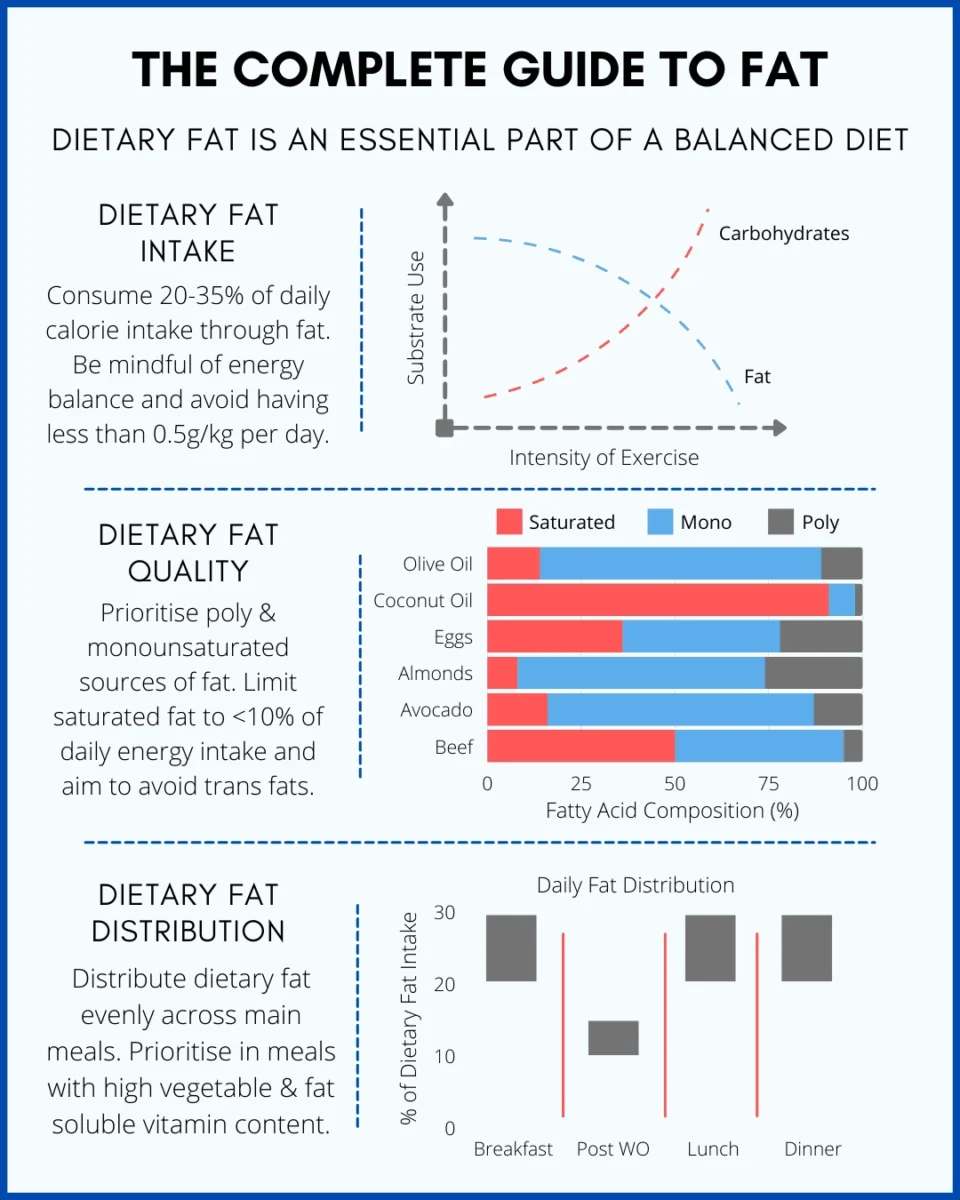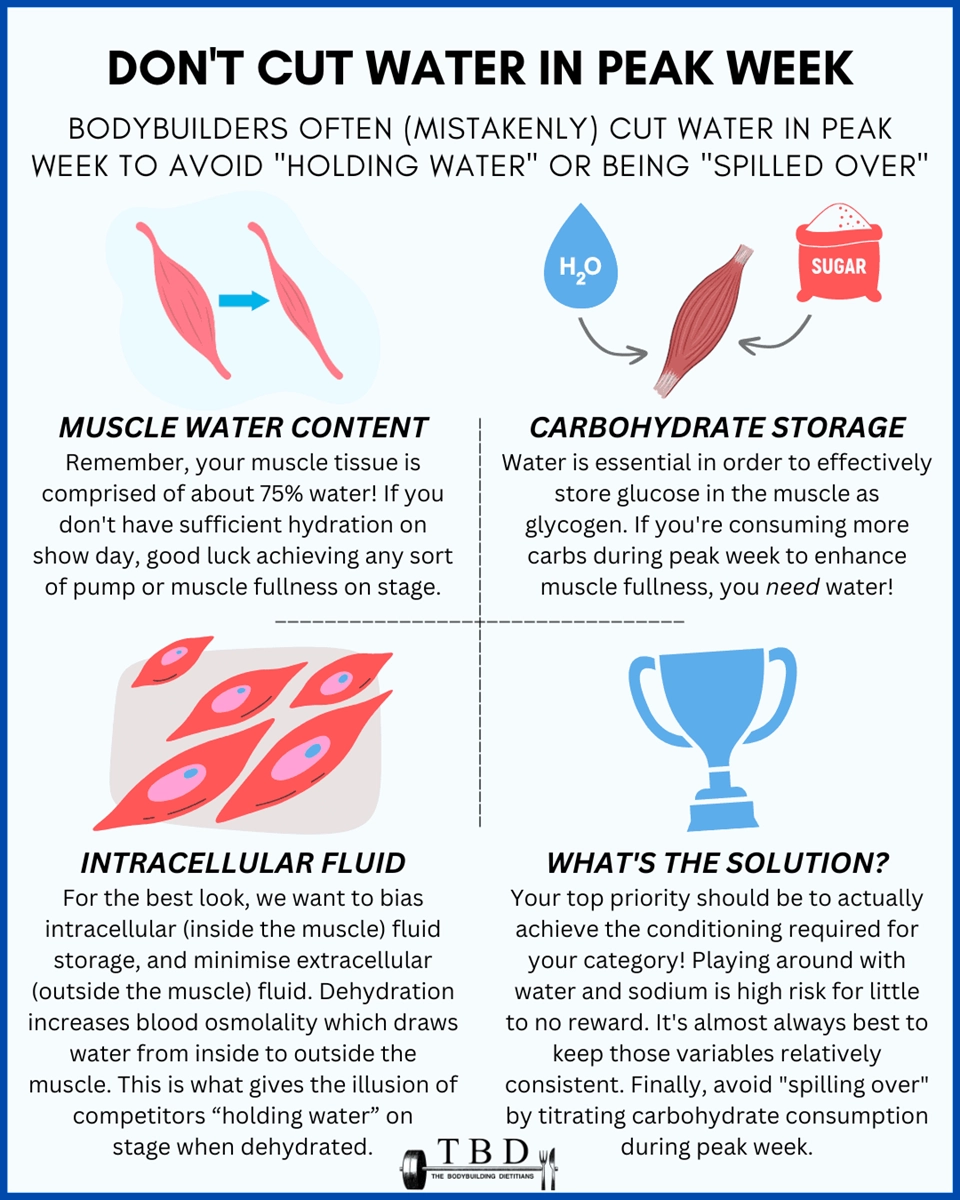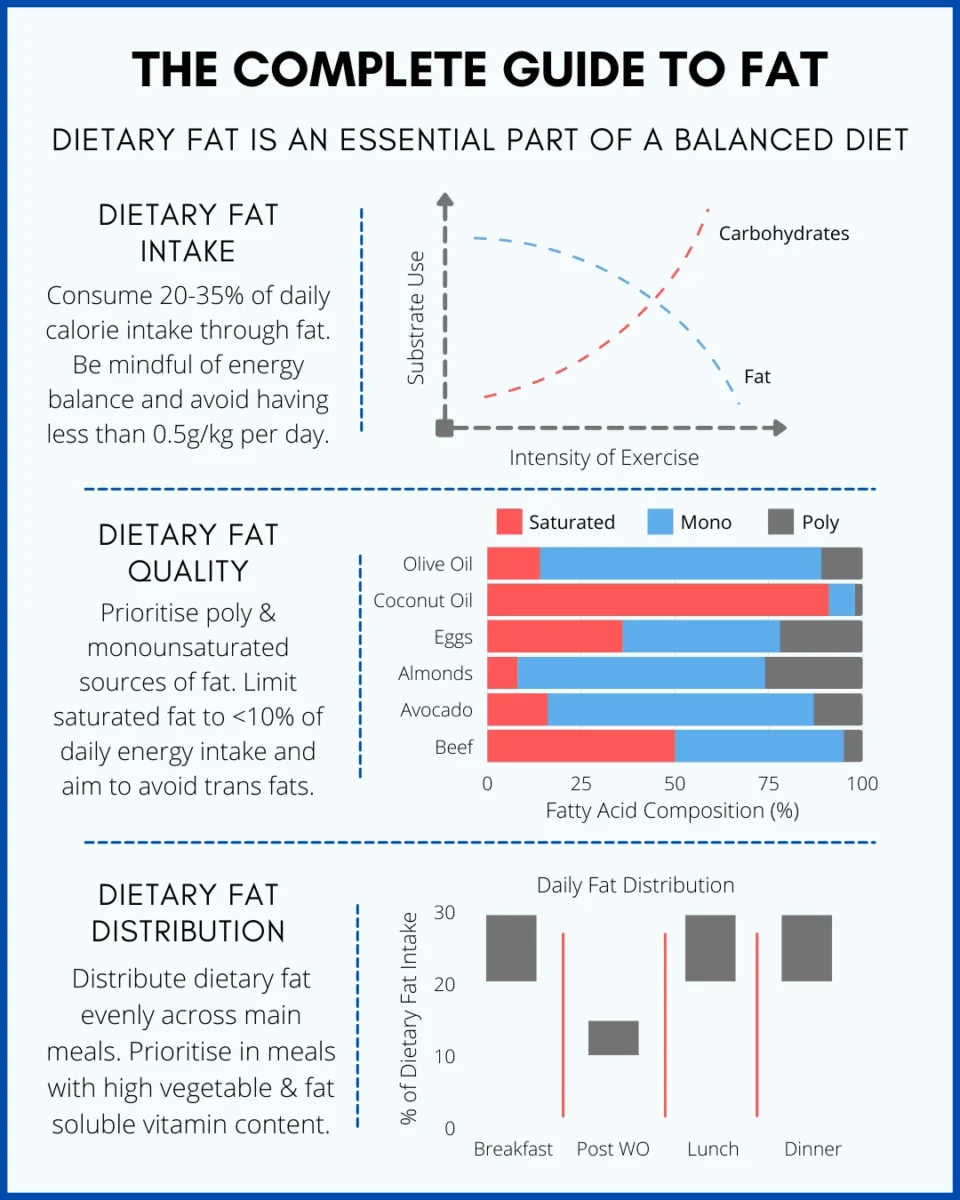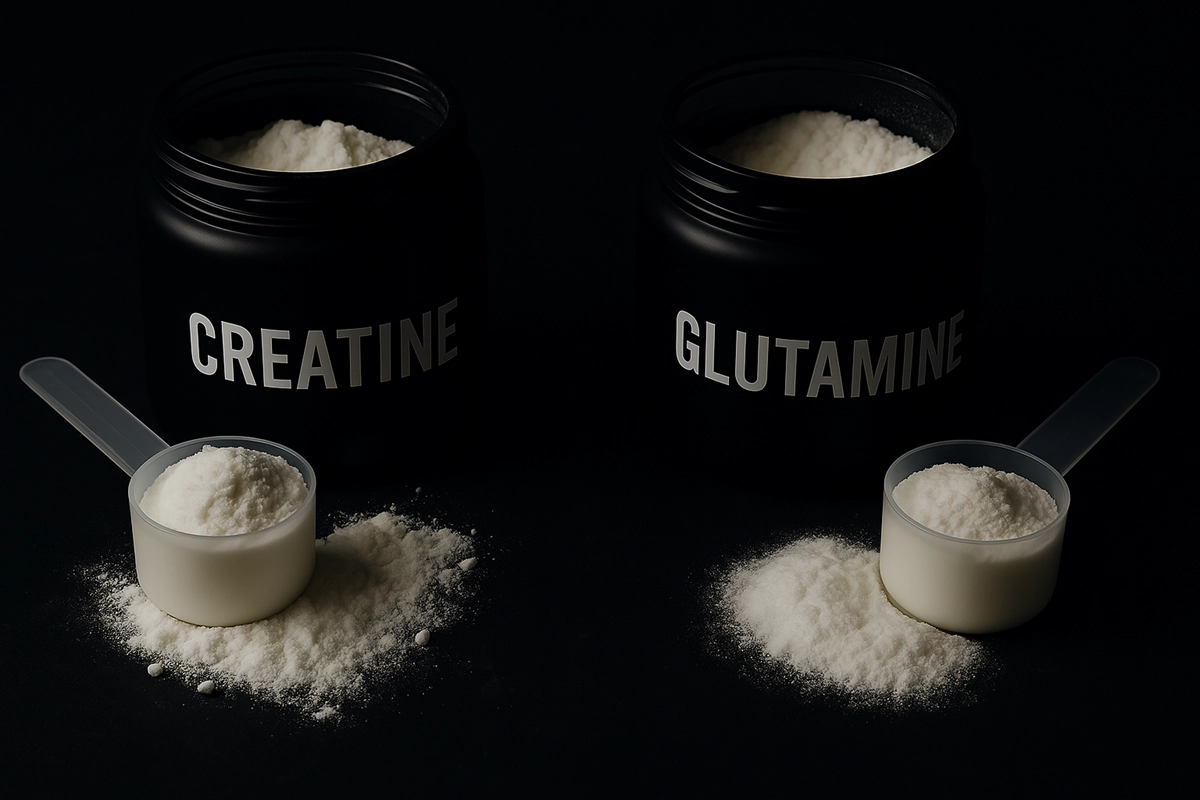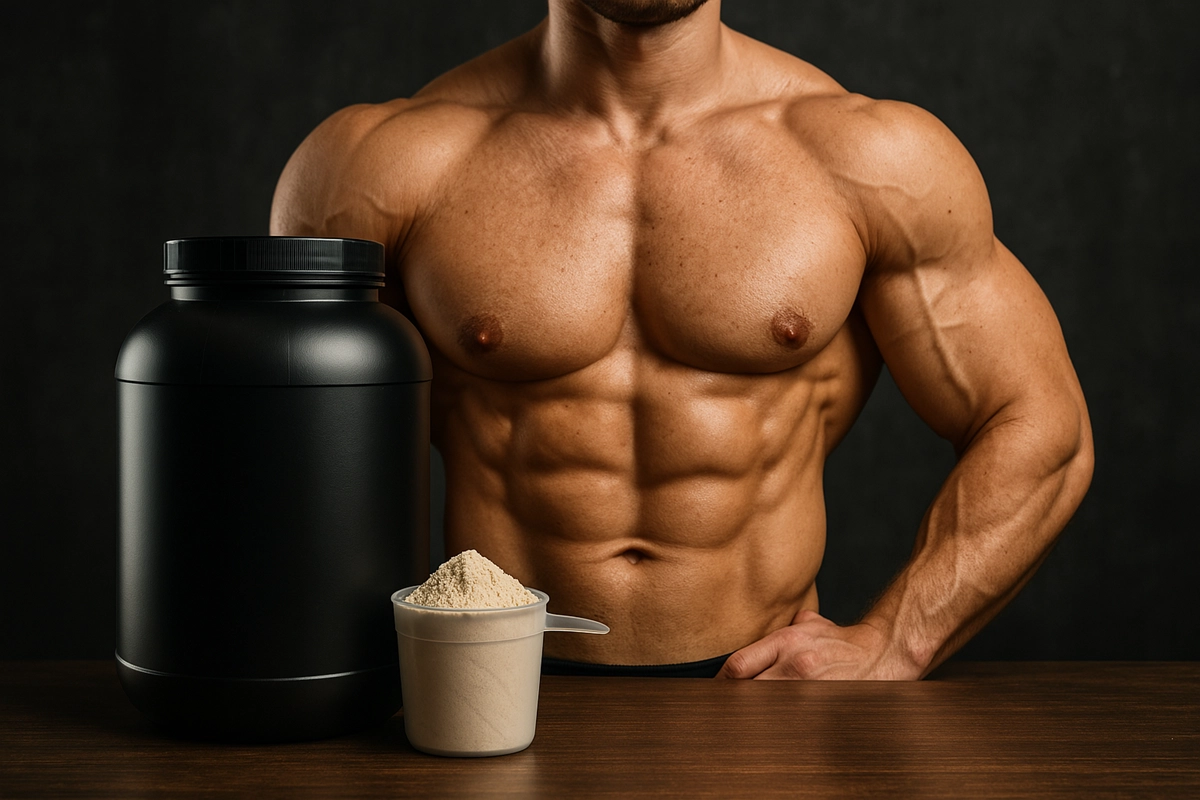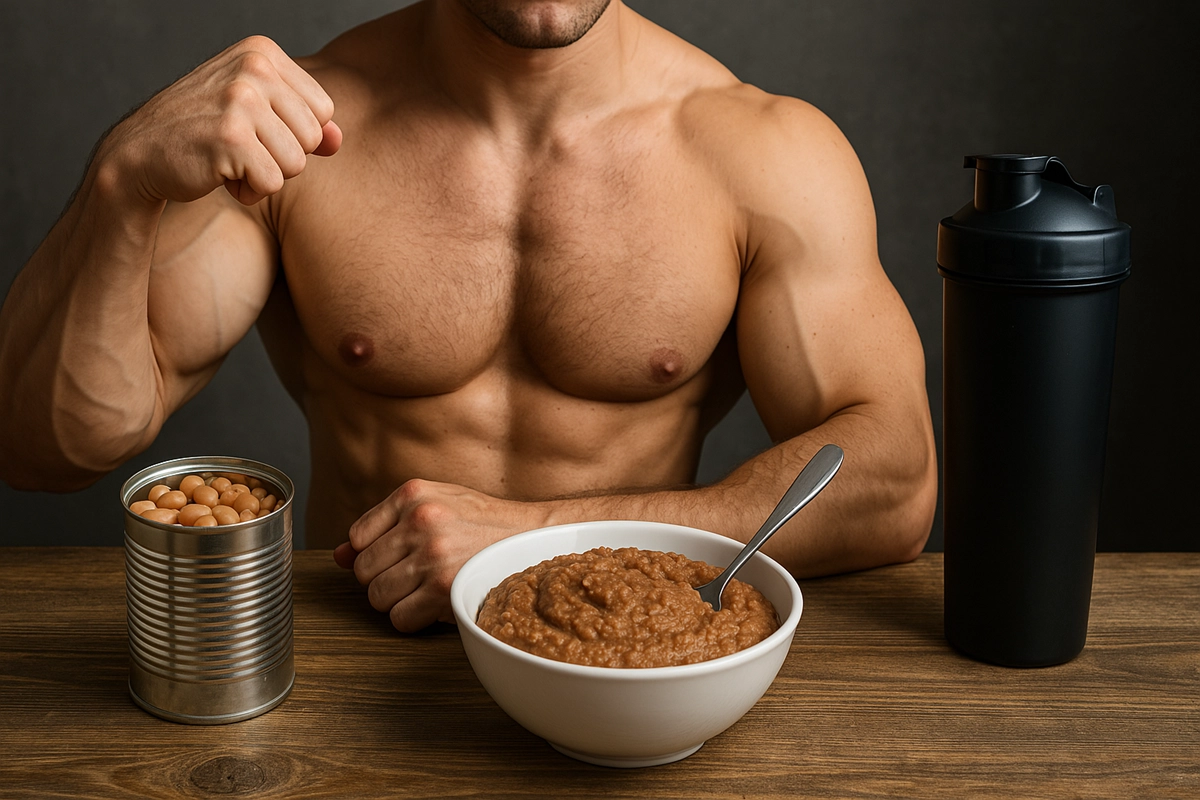Just as Arnold Schwarzenegger knew the power of “eating big to get big,” you’ll need to understand why carbohydrates are your muscle-building allies.
They’re not just another macronutrient – they’re the primary fuel source that powers your heaviest lifts and most intense training sessions. If you’ve been struggling to pack on muscle mass or hit new PRs in the gym, your carb strategy might be the missing piece of the puzzle.
Let’s reveal the secrets of strategic carb consumption for maximum gains.
What are Carbohydrates?
Carbohydrates, the powerhouse macronutrient that fueled Arnold’s legendary workouts, are essential organic compounds made of carbon, hydrogen, and oxygen atoms.
As your primary energy source, they’re vital for muscle growth and ideal bodybuilding performance, delivering 4 kcal per gram.
These compounds come in three primary forms:
- Sugars
- Starches
- Fiber
When you’re training hard, like Arnold did, your body relies on carbohydrates to power through intense workouts and support protein intake for muscle recovery.
You’ll find the best carbs in whole grains, fruits, and vegetables, which provide sustained energy and essential nutrients.
However, be cautious with refined carbohydrates found in processed foods – they won’t give you the same muscle-building benefits as their wholesome counterparts.
Types Of Carbs
Carbohydrates play a crucial role in bodybuilding by providing energy for intense workouts. Simple carbs offer quick energy, while complex carbs ensure sustained endurance. Balancing these types supports muscle recovery and growth.
1. Simple Carbs
Simple carbs digest quickly. They provide a quick burst of energy. Examples include sugar, honey, and fruit juice. These carbs can spike blood sugar levels. They are helpful for quick energy before workouts.
2. Complex Carbs
Complex carbohydrates digest slowly and provide long-lasting energy. Examples include whole grains, vegetables, and legumes. These carbs help maintain stable blood sugar levels and are good for sustained energy throughout the day.
Simple Carbs vs Complex Carbs: What’s the Difference?
When you’re planning your muscle-building nutrition, understanding the key difference between simple and complex carbs can make or break your gains.
Simple carbs digest quickly, causing rapid spikes in blood sugar levels that can leave you feeling drained and craving more food. While they provide fast energy, they’re not your best choice for sustained muscle mass development.
Complex carbohydrates are your workout warrior’s best friend. They digest slowly, providing steady energy levels throughout your training sessions.
You’ll find these muscle-friendly carbs packed with dietary fiber and essential nutrients. Unlike their simple counterparts, complex carbs won’t send your blood sugar on a roller coaster ride, helping you maintain consistent energy and focus during those heavy lifting sessions.
Importance of Carbohydrates for Muscle Gain
You’ll find that carbohydrates are your muscles’ preferred energy source. They power you through intense workouts while storing glycogen for sustained performance.
Your body uses carbohydrates to protect muscle tissue from breakdown during exercise and to enhance protein synthesis, the process that builds new muscle.
The strategic timing of carbohydrate intake stimulates insulin release, which helps shuttle nutrients into your muscle cells and creates an ideal environment for growth.
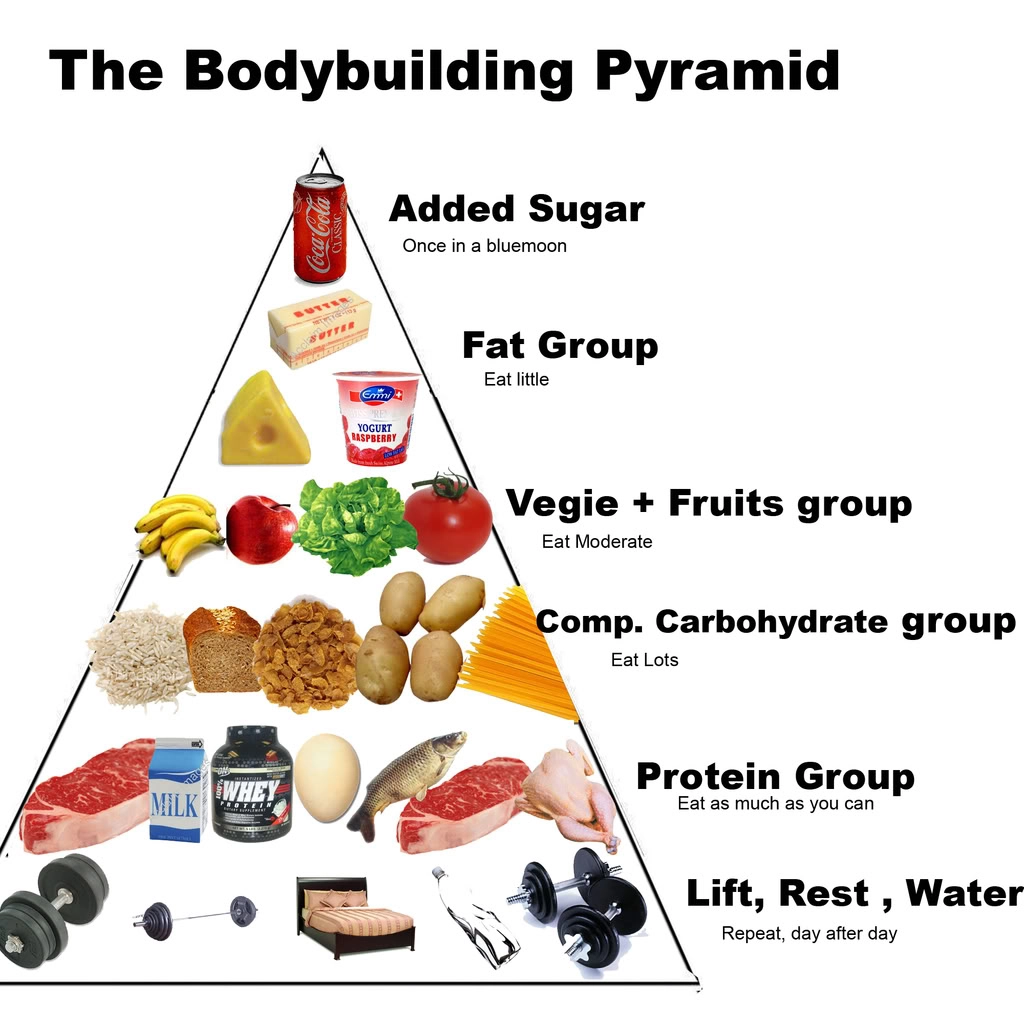
#Source of Energy for Workouts
The power to endure intense workouts starts with proper fuel in your muscles. When you’re lifting heavy weights, your body needs a reliable source of energy, and carbohydrates are your best ally.
During high-intensity exercise and intense weightlifting, your muscles break down muscular glycogen to power through each rep. Think of carbohydrate intake as loading your body’s energy tanks before battle.
For ideal bodybuilding performance, you’ll want your glycogen stores fully stocked. Your muscles rely on this stored energy to execute powerful contractions and maintain intensity throughout your training session.
Without adequate carbs, you’ll likely experience early fatigue and decreased performance. That’s why successful bodybuilders prioritize strategic carbohydrate timing to guarantee they’re fully fueled for every workout.
#Storing Glycogen in Muscle
Muscles crave glycogen like bodybuilders crave their next workout—it’s vital for growth and performance. When you’re aiming for peak muscle growth, maintaining adequate glycogen stores through proper carbohydrate intake becomes essential for your athletic performance.
Think of your muscles as a high-performance engine that needs premium fuel. During an intense workout, your body relies heavily on these glycogen stores to sustain energy throughout your training session.
Without sufficient glycogen, you’ll hit the wall before achieving maximum muscle protein synthesis.
Just as Arnold always emphasized the importance of proper nutrition, you’ll need to focus on replenishing your glycogen stores after each workout. This allows you to maintain consistent energy levels for your next training session, ultimately supporting your muscle growth goals.
#Aids in Protein Synthesis
When it comes to building quality muscle mass, carbohydrates play an essential behind-the-scenes role in protein synthesis.
Your body requires significant energy to build new muscle tissue, and proper carbohydrate intake is vital for this.
Think of carbohydrates as your muscle-building fuel source. While you’re focused on protein consumption, it’s the energy from carbs that powers the protein synthesis process. Without adequate caloric intake from carbohydrates, your body can’t efficiently convert protein into muscle tissue.
As Arnold always emphasized, glycogen metabolism and energy management are fundamental for serious gains. You’ll need to maintain sufficient carbohydrate levels to support your body’s muscle-building machinery.
This guarantees your system has the energy reserves necessary to construct new muscle fibers while preserving existing tissue.
#Minimizes Muscle Breakdown
By maintaining adequate carbohydrate intake, you’ll protect your hard-earned muscle mass from breaking down during intense training sessions. When your carb intake is too low, your body starts breaking down protein for energy instead of using it for muscle repair and growth.
Smart carbohydrate manipulation is vital for preserving body composition and essential amino acids. Without sufficient carbohydrates, even in a caloric surplus, you risk significant muscle loss.
Think of carbs as your muscles’ shield—they prevent protein content from being converted to energy, allowing it to focus on building and maintaining muscle tissue.
Arnold himself was known for emphasizing the importance of strategic carb timing. He noted that his most successful bulk phases always included adequate complex carbohydrates to prevent muscle catabolism during heavy training periods.
#Stimulate the Release of Insulin Hormone
Strategic consumption of carbohydrates triggers one of your body’s most potent anabolic hormones – insulin.
When you’re pursuing serious muscle growth through bodybuilding, understanding this hormone’s role is essential for maximizing your gains.
Here’s what happens: When you eat carbohydrates, your body releases insulin to help manage blood sugar levels.
But insulin does more than that – it’s your body’s primary nutrient transport system. It shuttles amino acids and other necessary nutrients directly into your muscle cells, creating an ideal environment for growth and recovery.
For bodybuilders, this insulin response means you’ll want to time your carb intake strategically, especially around your workouts.
This approach helps guarantee that the nutrients you’re consuming are being efficiently used for muscle building rather than being stored as fat.
#Support Muscle Recovery
The intense demands of bodybuilding training severely deplete muscle glycogen stores, making proper carbohydrate intake vital for recovery.
After high-intensity resistance training, you’ll need adequate grams of carbohydrates paired with grams of protein to jumpstart your muscle recovery process. Your body’s ability to repair and build muscle depends on replenishing these critical glycogen stores quickly.
Carbohydrate supplements can accelerate this process, especially when you’re pursuing aggressive muscle-building and body composition goals.
For best results, aim to consume carbs within 30 minutes after your workout. This timing aligns with your body’s enhanced ability to absorb nutrients and restore glycogen levels.
Remember Arnold’s famous advice: “Feed the muscle, not just train it.” This approach guarantees you’re providing your body with the fuel it needs for continuous growth and improvement.
#Regulate Hormone Levels
Proper carbohydrate intake goes beyond fueling workouts and recovery—it’s a powerful tool for optimizing your hormonal environment.
When building muscle, maintaining balanced hormone levels is vital for success. Your carbohydrate intake directly influences key hormones that affect muscle growth.
If you don’t consume enough carbs, your body’s cortisol levels can spike, creating a stress response that works against your bodybuilding goals. This elevated cortisol can interfere with testosterone production and slow down your progress in the gym.
Carbs Vs. Other Macronutrients
Carbs provide quick energy. Proteins help in muscle repair and growth. Both are important for bodybuilders. Carbs fuel your workouts. Proteins build and repair muscles. You need both for the best results. Without carbs, you may feel tired. Without protein, muscles cannot grow well. Balanced intake is key.
Fats are also essential. They help in hormone production. Carbs give you quick energy. Fats provide long-lasting energy. Both are essential, but in different ways. Carbs should be your primary source of energy. Fats should be a smaller part of your diet. Choose healthy fats like nuts and avocados. Avoid bad fats like those in junk food.
Common Carb Myths
Carbs play a crucial role in bodybuilding by providing energy and aiding muscle recovery. Misconceptions about carbs often lead to unnecessary dietary restrictions.
Proper carb intake can enhance performance and support muscle growth.
1. Carbs And Fat Gain
Many people think carbs make you gain fat. This is a myth. Carbs give you energy. You need energy for workouts. Without carbs, workouts are brutal.
Eating too many carbs can cause weight gain, but so can overeating. Balance is key. Choose whole grains, fruits, and vegetables. These are healthy carbs.
2. Low-carb Diets
Low-carb diets are popular. Some people think they are the best. These diets can make you lose weight. But they are not always suitable for bodybuilding. Carbs help your muscles recover.
They also give you energy for long workouts. A low-carb diet might make you feel tired. It can also slow muscle growth. Eating some carbs can help you build muscle.
Carbohydrate Food Chart
Understanding different types of carbohydrates and their food sources can enhance your muscle-building potential. As part of a well-balanced diet, your carbohydrate intake should come from both simple and complex carbohydrates.
Simple carbohydrates from fruits, honey, and dairy provide quick energy for your workouts. They’re beneficial for immediate pre- and post-workout nutrition.
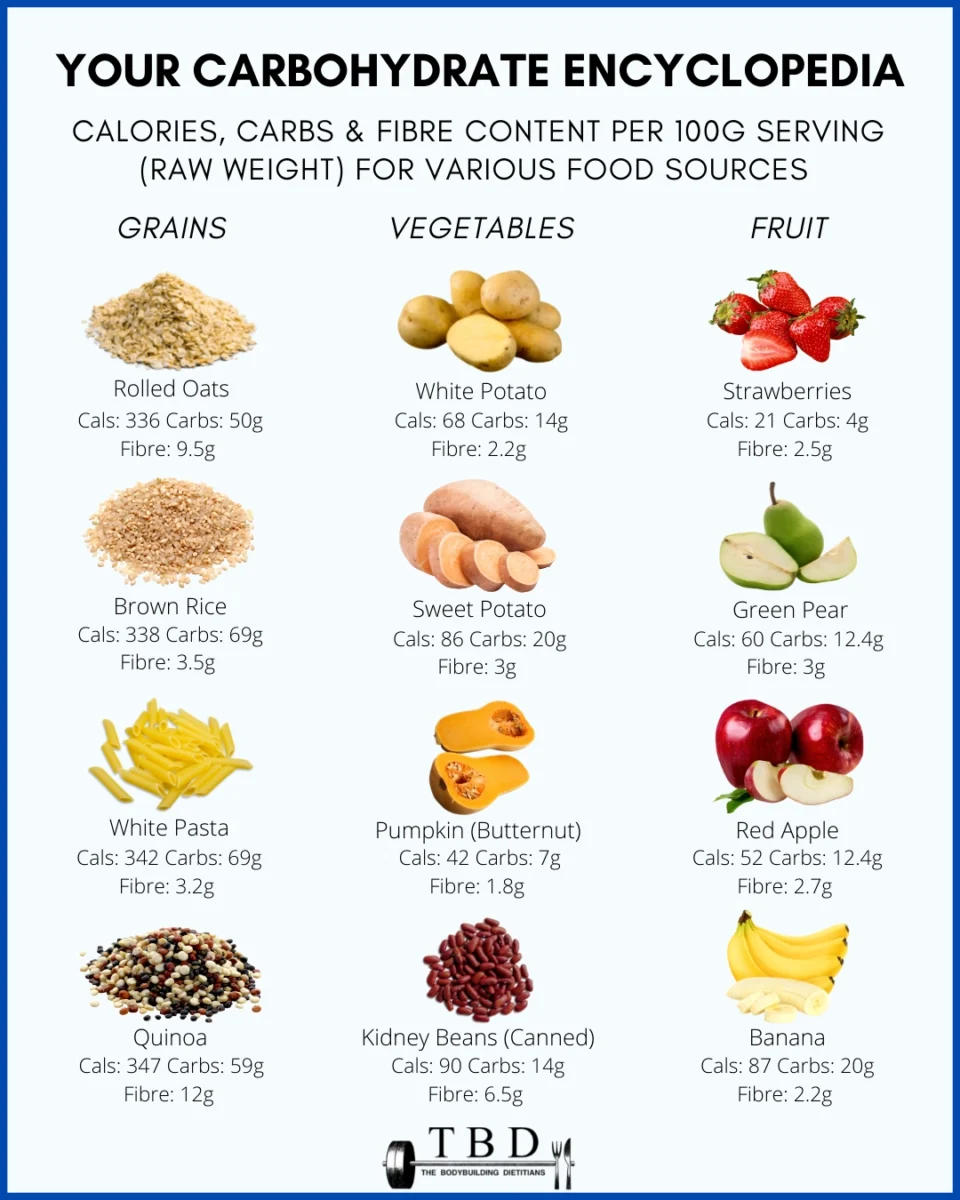
Complex carbs from sources like rice, whole grains, and potatoes offer sustained energy throughout the day.
For ideal dietary adherence, incorporate these key sources:
- Quick-energy foods: fruits, honey, dairy
- Sustained-energy starches: rice, corn, potatoes
- Fiber-rich options: oats, vegetables, legumes
Track your carb grams based on your training intensity. For muscle growth, the recommended range is 2-3g per pound of body weight.
What are the Best Carbs for Bodybuilding?
To maximize muscle growth and performance, you’ll need different types of carbs at specific times during your bodybuilding journey.
Knowing when to consume simple carbs versus complex carbs can make the difference between mediocre and exceptional results in your training sessions.
Let’s examine the best carb choices for pre-workout energy, intra-workout fuel, post-workout recovery, and regular daily meals, just as Arnold strategically planned his nutrition around his intense training schedule.
#Pre-Workout
When preparing for an intense workout, selecting the right pre-workout carbohydrates can make the difference between a lackluster session and crushing your goals like Arnold in his prime.
Your carbohydrate intake before training should focus on simple carbs that’ll deliver quick energy to your muscles.
You should time your pre-workout nutrition about 30 minutes before hitting the weights. Here’s what you can choose from:
- Fresh fruits like bananas or apples
- Dried fruits, including dates and raisins
- Energy drinks are designed for workout performance
These options are rapidly digested, so they’ll fuel your muscle growth and performance without sitting heavily in your stomach.
#Intra-Workout / During Workout
During those grueling sets that separate champions from challengers, your muscles need a steady stream of carbohydrates to maintain peak performance.
To prevent glycogen depletion during your workout, focus on easily digestible simple carbohydrates that provide quick energy.
Your intra-workout nutrition options include:
- Energy drinks formulated for sports med standards
- Carbohydrate gels (similar to what marathoners use)
- Fast-digesting fruits like bananas or dates
Even Arnold understood the importance of maintaining energy levels mid-workout, often keeping a simple carb source nearby during his most intense training sessions.
Consuming these quick-acting carbohydrates during your workout will help sustain muscle growth and maintain the intensity needed for maximum gains.
#Post-Workout
The vital post-workout window demands strategic carbohydrate choices to maximize your gains and recovery.
To support ideal muscle growth after training, you’ll need to focus on replenishing glycogen stores with complex carbohydrates. Pair your protein-rich food with nutrient-dense carbs like sweet potatoes, quinoa, or brown rice.
These options provide sustained energy and support complete recovery.
Here’s what you should include in your post-workout nutrition:
- Complex carbohydrates (2-3 servings)
- Quality protein source
- Mass gainers (if bulking)
Remember how Arnold always emphasized the importance of post-workout nutrition? He’d often combine his protein shake with complex carbs to fuel his legendary workout recovery.
Your muscles are primed for nutrients after training, so don’t skip this vital window for growth.
#Rest of the Day (Regular Meals)
Beyond the post-workout window, your daily meals need to maintain a steady stream of quality carbohydrates to support muscle growth and energy levels.
Your carbohydrate intake should focus on nutrient-dense sources that provide sustained energy throughout the day.
To optimize muscle growth, combine whole grains like quinoa, brown rice, and oats with lean proteins such as chicken breast or fish.
Remember to include plenty of fruits and vegetables in your meals. They provide essential vitamins and fiber while helping regulate blood sugar levels.
Balance your plate by adding healthy fats from sources like avocados, nuts, and olive oil. Arnold always emphasized the importance of eating “like a king” throughout the day, making sure each meal contained the right mix of macronutrients to fuel intense training sessions.
Effect of Low-Carb Intake on Muscle Growth
When you don’t eat enough carbs, your gym performance will suffer as your energy levels and glycogen stores plummet.
Your body might start breaking down muscle tissue for energy, especially during intense workouts – something Arnold always warned against in his golden-era training principles.
Without adequate carbohydrates, you’ll struggle to maintain the training intensity needed for peak muscle growth, and your recovery between sessions will suffer considerably.
1. Decreased Energy Levels
Since carbohydrates serve as your body’s primary fuel source, maintaining ideal energy levels becomes nearly impossible when you drastically reduce your carb intake.
You’ll likely experience decreased energy levels during high-intensity workouts, which can significantly impact your muscle growth potential and overall workout performance.
When you follow a low-carb diet, your body struggles to maintain the intensity needed for proper muscle-building sessions.
The resulting fatigue isn’t just mental – it’s physical depletion that prevents you from pushing through those vital last reps.
As Arnold always emphasized, “the last three or four reps are what make the muscle grow.”
Without adequate carbohydrate intake, you’re basically training with one arm tied behind your back, limiting your ability to achieve maximum muscle gains.
2. Insufficient Glycogen Stores
Although your muscles can store impressive amounts of glycogen, following a low-carb diet quickly depletes these essential energy reserves.
When you don’t consume enough carbohydrates, your body struggles to maintain sufficient glycogen stores needed for intense training sessions.
Without adequate glycogen stores, you’ll notice significant drops in performance and reduced muscle growth potential.
Your body’s ability to sustain energy during exercise becomes compromised, making it harder to complete those vital last few reps that stimulate muscle growth.
Even Arnold Schwarzenegger, known for his intense training philosophy, emphasized the importance of carbohydrates for maintaining glycogen levels.
To enhance your muscle-building efforts, you must guarantee proper carbohydrate intake to keep your glycogen stores full.
This strategy helps maintain sustained energy levels throughout your workouts and supports peak muscle growth.
3. Potential Muscle Catabolism
A significant danger of low carbohydrate intake is the body’s tendency to break down muscle tissue for energy, a process known as muscle catabolism.
When you don’t provide enough carbohydrates for your workouts, your body will begin dismantling muscle protein to meet its energy demands. This counterproductive process directly opposes your bodybuilding goals, as you’ll struggle to maintain, let alone build, muscle mass.
Even Arnold Schwarzenegger, known for his massive physique, always emphasized the importance of adequate carbohydrate consumption.
The impact on your recovery will be noticeable—you’ll find yourself feeling weaker during workouts and taking longer to bounce back between training sessions. To prevent muscle catabolism and support peak muscle growth, you need to verify that you’re consuming sufficient carbohydrates alongside your protein intake.
4. Reduced Training Intensity and Volume
When your carbohydrate intake drops too low, you’ll notice an immediate decline in your training performance and power output during workouts. This reduction in training intensity can considerably impact your fitness goals and limit muscle growth potential.
Without adequate carbohydrates, you’ll struggle to maintain the volume of resistance training necessary for ideal muscle development. Short-term studies have shown that low-carb diets can decrease your ability to perform multiple sets at high weights, leading to increased muscle damage and slower recovery between workouts.
Even Arnold Schwarzenegger, known for his intense training sessions, emphasized the benefits of carbohydrate manipulation for maintaining workout intensity. You’ll need to guarantee sufficient carb intake to power through those challenging sets and achieve the muscle-building stimulus your body needs for growth.
5. Impaired Muscle Recovery
Since your muscles rely heavily on glycogen stores during intense training, proper carbohydrate intake becomes essential for ideal recovery and growth.
When you’re in a low-carbohydrate condition, you’ll likely experience impaired muscle recovery and compromised muscle protein synthesis.
Without adequate carbs post-workout, your body struggles with glycogen replenishment, leading to delayed healing and increased soreness.
Even Arnold, known for his high-volume training, emphasized the importance of carbohydrates for recovery.
You’ll notice that training sessions become more challenging to bounce back from, and your muscles take longer to repair themselves.
To optimize your recovery, you’ll need to maintain sufficient carbohydrate intake, especially during the critical post-workout window.
This guarantees your body has the resources needed to rebuild and strengthen muscle tissue effectively.
6. Altered Hormonal Balance
Low-carb diets don’t just impact your recovery; they can throw your entire hormonal system off balance.
When you drastically reduce carbohydrates, as in a ketogenic diet, you’ll experience significant changes in two key hormones: insulin and cortisol.
Your body needs insulin to drive nutrients into your muscles, supporting muscle growth and preventing fat gain. Without adequate carbohydrates, your insulin levels drop, potentially compromising your ability to build mass.
Meanwhile, cortisol – your stress hormone – tends to increase on very low-carb diets. This elevated cortisol can work against your muscle-building goals by breaking down muscle tissue and promoting fat storage around your midsection.
Even Arnold, known for his balanced approach to nutrition, emphasized the importance of maintaining proper hormonal balance through sufficient carbohydrate intake during his competitive years.
7. Reduced Endurance
Although many bodybuilders focus primarily on resistance training, your endurance capacity plays an essential role in muscle growth and recovery. When you follow a low-carb diet, you’ll likely experience a significant drop in performance during endurance activities due to limited availability of glycogen in your muscles.
Your carbohydrate intake directly impacts your ability to sustain intense workouts. While acute strength training performance mightn’t suffer immediately, whole-muscle glycogen depletion can compromise your overall training capacity.
Even Arnold Schwarzenegger, known for his high-volume training approach, emphasized the importance of adequate carbs to fuel his marathon gym sessions.
To optimize muscle growth, you’ll need sufficient glycogen stores to:
- Complete higher-rep sets effectively
- Maintain workout intensity
- Support post-exercise recovery
- Prevent premature fatigue during training
8. Potential Nutrient Deficiency
Beyond impacting your endurance and workout performance, restricting carbohydrates can create significant gaps in your nutritional intake.
Many carbohydrate-rich foods you’d typically consume are packed with essential vitamins and minerals that your body needs for ideal muscle function.
When you’re cutting carbohydrate intake too severely, you’re not just eliminating energy sources – you’re potentially missing out on vital nutrients that support your gains.
Even Arnold, during his prime competing years, understood that while managing body fat was essential, extreme carb restriction wasn’t the answer.
You’ll need to maintain a balanced approach that includes quality carbohydrate sources to prevent nutritional deficiencies that could compromise your progress.
9. Impact on Mood and Cognitive Function
When your brain doesn’t get enough carbohydrates, you’ll likely notice significant changes in your mental state that can derail your training progress.
A low-carb diet can trigger mood swings and irritability, making it harder to stay focused during workouts and maintain consistent training motivation.
Your brain relies heavily on carbohydrate intake for peak cognitive function, which directly impacts your ability to execute proper form and make smart training decisions.
Just as Arnold always emphasized the importance of mental clarity for muscle growth, you’ll need adequate carbs to maintain your well-being and training intensity.
When you’re following a restrictive diet, these mental effects can create a negative cycle – poor mood leads to poor workouts, which leads to reduced gains.
Maintaining balanced carbohydrate levels helps guarantee that both your mind and muscles perform at their best.
How Many Carbs Should You Consume during Bodybuilding?
Determining the right amount of carbs for your bodybuilding journey can feel like solving a complex puzzle. But don’t worry – research shows that consuming between 45-65% of your daily calories from carbohydrates can support ideal muscle growth during your usual strength training.
The key is finding your sweet spot within this range. To calculate your personal carb content, you’ll need to consider factors like your weight, activity level, and metabolism.
Long-term studies have shown positive effects when bodybuilders maintain adequate protein while adjusting their amount of carbohydrates based on individual response.
Start with the middle range (around 55%) and monitor your energy levels and progress. If you feel sluggish during workouts, increase your intake.
If you’re not seeing desired results, think about adjusting downward while maintaining essential minimums.
What is the Best Time to Eat Carbs for Bodybuilding?
You’ll need to time your carbohydrate intake strategically throughout your bodybuilding journey to maximize muscle growth and energy levels during workouts.
Just as Arnold Schwarzenegger was famous for eating specific meals at precise times, you’ll want to focus on consuming carbs pre-workout for fuel, during training for endurance, and post-workout for recovery.
Planning your carb consumption around these key windows, maintaining steady intake throughout the day, and considering lighter amounts before bed will help you build and maintain that coveted muscle mass.
#Pre-Workout
Proper timing of carbohydrate intake before your workout can make the difference between a lackluster session and crushing your goals like Arnold in his prime.
To maximize your pre-workout energy supply, you should fuel your body with complex carbohydrates 1-2 hours before hitting the weights.
Think of your muscles as high-performance engines – they need the right fuel at the right time. By consuming a balanced meal of complex carbohydrates with some protein, you’re ensuring your glycogen stores are fully loaded for peak performance.
This strategic timing creates a sustained energy release that’ll keep you powered through even the most intense training sessions.
Just like Arnold’s famous dedication to preparation, your pre-workout nutrition can set the stage for serious muscle gains.
#Intra-Workout
While your pre-workout meal sets the foundation, consuming carbs during your workout can be the secret weapon for maintaining peak performance throughout grueling sessions.
Your training status and workout intensity determine whether you’ll benefit from intra-workout carbohydrate intake. During extended sets of resistance training lasting over 90 minutes, your glycogen stores can become depleted.
For ideal ergogenic effects, consider sipping on a carb drink if you’re performing high-volume workouts or following long-term carbohydrate diets with restricted calories.
Acute carbohydrate manipulation during training can help prevent muscle breakdown and maintain energy levels. As Arnold once said, “The last three or four reps are what makes the muscle grow,” and having adequate fuel through smart intra-workout nutrition can help you push through those vital final reps.
#Post-Workout
After pushing your muscles to their limits, the post-workout window presents an essential opportunity to kickstart recovery through strategic carbohydrate timing.
You should prioritize carbohydrate intake within 30 minutes after training, when your muscles are primed to replenish depleted glycogen stores.
For peak muscle recovery, combine fast-digesting carbs with protein in a 2:1 ratio. Natural sugars from fruits paired with a protein shake can jumpstart muscle protein synthesis. As Arnold often said, “Feed the muscle, not just the body.”
Key post-workout nutrition guidelines:
- Consume 0.5-0.7g of carbs per pound of body weight
- Include 20-30g of protein alongside carbs
- Choose easily digestible sources like bananas, rice, or sweet potatoes
- Avoid high-fat foods that slow nutrient absorption
#Throughout the Day
Strategic carbohydrate timing throughout your day plays a pivotal role in maximizing muscle growth and sustaining energy levels for intense training.
To optimize your muscle-building potential, you’ll want to distribute your carbohydrate intake evenly across meals. Focus on complex carbohydrates from whole grains, fruits, vegetables, and legumes to maintain stable blood glucose levels.
This steady supply of energy helps prevent muscle fatigue during traditional strength training sessions and supports continuous muscle growth.
Think of your body as a high-performance engine – it needs consistent fuel to operate at its best. By spacing out your carbs, you’re providing a reliable energy source that keeps your muscles primed for growth.
Even Arnold knew the importance of strategic carb timing, famously stating that proper nutrient distribution was as significant as the training itself.
#Before Bed
Since your muscles continue repairing and growing while you sleep, proper carbohydrate timing before bed can significantly impact your bodybuilding progress.
If you’re following an intense training regimen, including complex carbohydrates in your evening meal plan might be beneficial.
Your body processes complex carbohydrates slowly, providing steady energy release throughout the night and preventing glycogen depletion.
This sustained fuel supply supports overnight muscle recovery and growth.
However, individual responses to nutrient timing vary considerably, so you’ll need to experiment with your pre-bed carbohydrate intake.
For ideal results, consider adding a small portion of oatmeal, sweet potato, or quinoa to your final meal.
Remember to monitor how your body responds and adjust portions based on your training intensity and personal recovery needs.
To Wrap It All Up
You’ve now got the tools to fuel your muscle-building journey with the power of carbohydrates. Think of your muscles as a high-performance engine – they need quality fuel to perform and grow. Whether you’re pumping iron like Arnold or just starting out.
Remember to time your carbs strategically, choose the right sources, and maintain consistent intake. Your muscles are waiting to transform, and proper carb nutrition is your key to releasing that potential.
FAQs
What Role Do Carbohydrates Play in Bodybuilding?
Carbohydrates provide energy for workouts, support muscle recovery, and help replenish glycogen stores. Bodybuilders use carbs to fuel intense training and preserve muscle mass by preventing the body from breaking down protein for energy.
Are Simple or Complex Carbs Better for Muscle Gain?
Complex carbs are better for muscle gain because they provide sustained energy, stabilize blood sugar, and improve workout endurance. Simple carbs may help post-workout but are less effective for long-term gains due to insulin spikes and energy crashes.
How Many Carbs Should I Eat Daily to Build Muscle?
Eat 3 to 5 grams of carbohydrates per pound of body weight daily to build muscle. Adjust intake based on training intensity, body composition, and metabolism. For example, a 180-pound person may need 540 to 900 grams of carbs per day.
What Are the Best High-Carb Foods for Bulking?
The best high-carb foods for bulking include oats, brown rice, sweet potatoes, bananas, and whole-grain pasta. These foods offer complex carbohydrates, fiber, and micronutrients essential for energy and muscle growth.
When Should Bodybuilders Eat Carbs for Optimal Results?
Bodybuilders should eat carbs before and after workouts. Pre-workout carbs provide energy, while post-workout carbs restore glycogen and enhance muscle recovery. Spreading carbs throughout the day also supports overall performance.
What Are the Best Carb Supplements for Bodybuilding?
The best carb supplements for bodybuilding include dextrose, maltodextrin, and highly branched cyclic dextrin. These fast-digesting carbs rapidly replenish glycogen, fuel muscle recovery, and improve post-workout performance.
Which Carb Powders Are Best for Post-workout Recovery?
The best carb powders for post-workout recovery are dextrose, maltodextrin, and cyclic dextrin. These powders digest quickly, spike insulin to transport nutrients, and accelerate muscle glycogen restoration.


